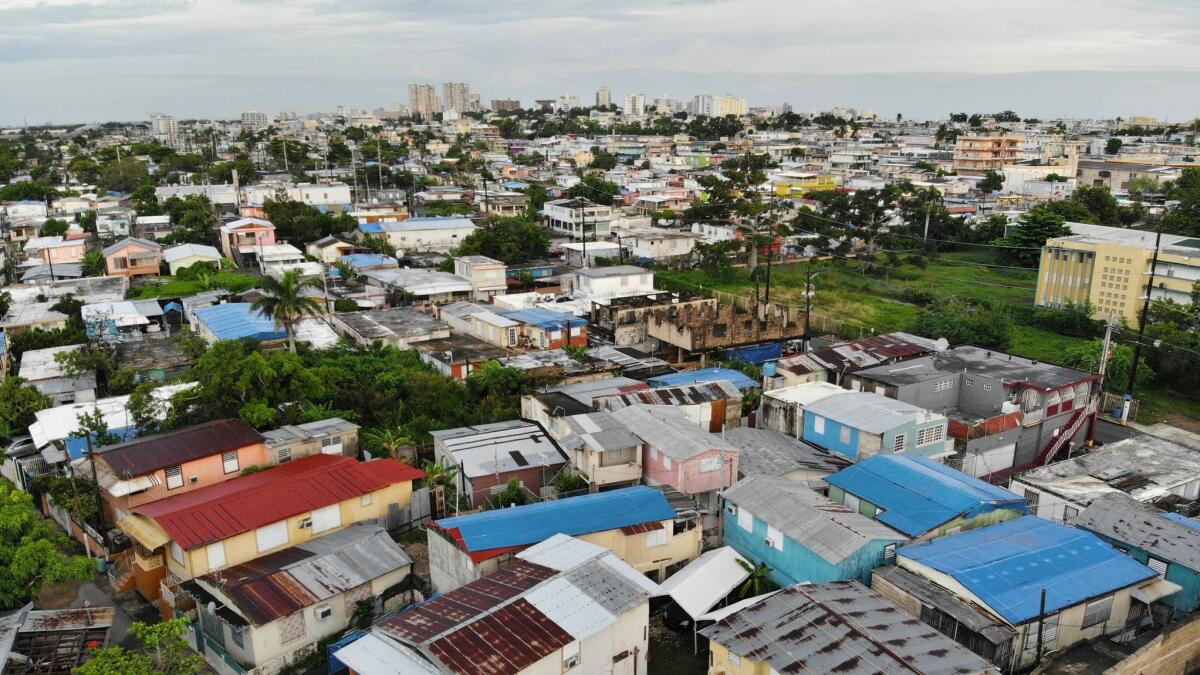Op-Ed: Puerto Rico needs more than an AOC-inspired morale boost to recover from its disasters

- Share via
After a stretch of disastrous years that included a recession, a debt crisis, bankruptcy, a hurricane and the exodus of thousands of residents from the island, 2019 is shaping up to be a good year for Puerto Rico — or at least for Puerto Rican morale.
Several things came together, mostly by chance, to lift the island’s spirits and give Puerto Ricans a sense of hope.
That is due, in important measure, to two New York Puerto Ricans, Lin-Manuel Miranda and Alexandria Ocasio-Cortez, who have brought the world’s attention to the island.
Miranda’s rise to fame in the United States was meteoric, and earlier this year, he reflected some of that glory back onto his family’s homeland with a three-week staging of “Hamilton” in San Juan. The production lured thousands of American and international visitors to the island in January and raised $14 million for Puerto Rican artists and arts institutions. It ended with an epic final performance, after which Miranda tearfully wrapped himself in the Puerto Rican flag and brought down the house.
And then there’s Ocasio-Cortez, who also has Puerto Rican parents and has had her own phenomenal rise to celebrity, culminating with her swearing in as a U.S. congresswoman in January. She has not visited the island since 2016, but has called for the end to the territory’s colonial status and was photographed holding up the Puerto Rican flag.
Many Puerto Ricans consider statehood the only answer to their island’s woes.
Her upset victory over a high-ranking incumbent Anglo congressman made her an instant hit in her ancestral home. “Love her or hate her, the way she has carried herself reflects well on Puerto Rico,” said San Juan attorney and Democratic Party insider Andres W. Lopez. Now, he said, he is waiting to see if Ocasio-Cortez highlights issues that involve Puerto Rico directly.
The limelight associated with Puerto Rico’s famous progeny, a group that also includes Supreme Court Justice Sonia Sotomayor, has arguably already brought some benefit to the island. The New York Times, for example, recently named Puerto Rico the world’s No. 1 travel destination for 2019, something hotel consultant Simon Baeyertz says represents a real achievement, and not simply a “pity party for the hurricane.”
But leveraging the recent feel-good moments for long-term benefit will take far more.
The bankrupt island is operating under the strict oversight of a federal fiscal panel, which has brought punishing austerity measures. Unemployment is at 8.3%, more than double the U.S. rate overall, and 44% live below the poverty line.
The island has to reckon too with an inept and corrupt system of patronage and an over-dependence on government jobs and welfare.
On the plus side are attractive tax incentives for investors, affordable property values, a spate of economic activity related to hurricane rebuilding (with $1.5 billion in federal block grants for recovery on the way), and a general sense that the bottom has been hit.
Tourism is the most visible sign of better times. Old San Juan is again busy with visitors. Quaint hill towns and beaches in Isabela, Rincon, and Vieques also report increased tourism. And new, high-end boutique hotels are opening in the hotspot Condado district, known as one of the Caribbean’s “capitals of cool.”
“In a way, it’s as if the hurricane has connected the island with the mainland in a way I have never felt,” said Baeyertz.
Enter the Fray: First takes on the news of the minute »
The trick now will be strengthening that connection. For more than a century, Puerto Rico has had a complicated relationship with the United States. Though Puerto Ricans are U.S. citizens, those living in the island territory cannot vote in federal elections. They also do not pay federal taxes. The island receives less federal aid per capita for programs such as like Medicare, Medicaid and hurricane recovery than states do.
Many Puerto Ricans consider statehood the only answer to their island’s woes. Last year, Puerto Rico’s governor, Ricardo Rossello, sent a letter to President Trump urging him to support the island becoming a state and to abandon “territorial-colonialism.” But advocates haven’t successfully carried the fight to the U.S. Congress, which has the final say, and where statehood for Puerto Rico is neither urgent nor favored.
Some Puerto Ricans hope that high-profile Puerto Ricans on the mainland will help — as will the 5.1 million Puerto Ricans who live on the mainland and can help swing elections in some areas
“After spending decades as outsiders, in the margins of American society, the fact that everywhere you look in 2019, Puerto Rico and Puerto Ricans are in the thick of it — that is welcome indeed,’’ Lopez told me. “All of these developments have something in common: They place Puerto Rico and Puerto Ricans squarely in the middle of the national conversation.”
Luisita Lopez Torregrosa is a journalist and former editor at the New York Times. She is the author of two nonfiction books, most recently, “Before the Rain: A Memoir of Love & Revolution.”
More to Read
A cure for the common opinion
Get thought-provoking perspectives with our weekly newsletter.
You may occasionally receive promotional content from the Los Angeles Times.









